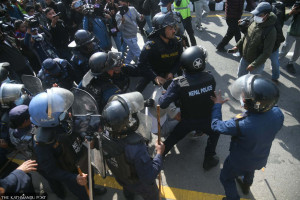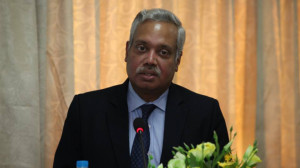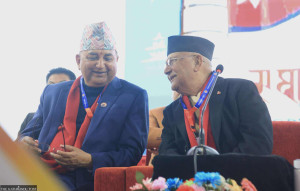National
Victims’ plaints at CIEDP top 1,500
The Commission of Investigation on Enforced Disappeared Persons (CIEDP) has received 1,563 complaints since complaints registration began in mid-April.
Dewan Rai
The Commission of Investigation on Enforced Disappeared Persons (CIEDP) has received 1,563 complaints since complaints registration began in mid-April.
The transitional justice body claims to have completed preliminary examination of 500 cases it received in the past one and a half months.
Having received more cases than the number incidents of disappearance registered by the Peace Ministry, the CIEDP has become optimistic about completing its tasks within the stipulated time. The ministry has recorded only 1,495 cases of disappearances.
“This shows the trust of the public on the commission,” said commission’s Chair Lokendra Mallick, “We are committed to give justice to the victims which was delayed by years.”
While the number of registered cases may have bolster Mallick’s confidence, victims claim the commission itself is ill-prepared to deal with the war-time cases.
The act of disappearance is not criminalised yet. Although the commission has forwarded a draft of the act, the government has put it on hold for reviewing its provisions. The commission will not be able to recommend for action even if it finds evidence to convict a perpetrator.
The Enforced Disappearances Enquiry, Truth and Reconciliation Commission Act-2014 has specified that the act of disappearance is serious human rights violation, which cannot be condoned. However, there is no law under which action can be recommended for the crime. “The commission has been showing the number of cases registered with it as its achievement,” said Ram Bhandari, president of the National Network of Families of the Disappeared (NEFAD), “But they have no policy on ways to move the process forward.”
The commission has not worked on policy frame to deal with the cases. It has not come up with any plan and programme to address the concerns of economic and social issues of the conflict victims.
“There is no reparation policy, no policy for psycho-social counselling and memorialisation,” said Bhandari, “The commission seems indifferent to extend the hand of partnership with conflict victims.”
But the conflict victims harbour doubts that the commission has required human resources as well as legal framework to conclude the process.
The recent nine-point deal between the ruling coalition partners—in which they agreed to withdraw war-era cases and grant amnesty to perpetrators—only reinformed victims’ mistrust over the process.
The agreement was reached as an initiation to conclude the peace process. The transitional justice process is a vital component of the peace process, which is supposed to deal with around 18,000 cases of extrajudicial killings, disappearance, torture and rapes. The political interference in the middle of the transitional justice bodies started its task has made everyone suspicious about the process. “I have little confidence over the process but we must hope for the best,” said Bhandari.
96 complaints in Tahanun
Ninety-six victims, who suffered both at the hands of state and rebel sides during the decade-long conflict, have filed their complaints at Local Peace Committee in Tanahun.
Out of them, 82 complaints have been put for the Truth and Reconciliation Commission and 14 for the Commission of Investigation on Enforced Disappeared Persons. The government had officially started collecting complaints from the victims from mid-April, but the authorities are expecting more complaints in the coming days.
“There are still chances of more complains,” said committee Secretary Bimal Giri.
A total of 206 people were killed in Tanahun during the insurgency, while around 400 people are believed to have been injured and displaced.




 15.12°C Kathmandu
15.12°C Kathmandu















